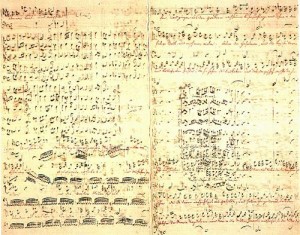Johann Sebastian Bach was born on this day in 1685 in Eisenach, Germany but by the Regency period, his music was mostly considered hopelessly old-fashioned and pedantic, except by scholars and professional musicians. Even the music of his highly successful son Johann Christian Bach, former music teacher to Queen Charlotte, had died in poverty in 1782 in London, was out of favor with popular taste. It wasn’t until 1829, after a century of silence, that the St. Matthew Passion was revived and performed by the young Felix Mendelssohn. There’s a fascinating account of how it came about here.
There is so much material available on Bach online–here are just a couple of places you can search: jsbach.org and baroquemusic.org. There are many, many recordings of his music, ranging from brilliant to poor, and, as happens with a great artist, some just plain wacko. His music ranges from the gorgeously tuneful to the highly cerebral. If you can, search out a performance, preferably one that’s HIP (historically informed performance). If you’re in the Washington DC area, there’s a performance of the great B Minor Mass on April 28.
Occasionally when you read about Bach you find glimpses of the human being behind the legend. Here’s Bach complaining about his income (which he did quite a lot):
My present post brings in about 700 thalers, and when there are a few more funerals than ordinairement, the perquisites (tips) increase proportionately; but when the air is wholesome, on the contrary, they diminish, this last year my ordinaire perquisites for burials declined by more than 100 thalers.
He lived in an era when musicians were regarded as servants, often required to wear livery. He was able to give his sons the university education he lacked, ensuring that they would be further up the social scale, and indeed two of them served in royal courts–JC in London and CPE (Carl Philipp Emmanuel) in Sweden and Germany. He never left Germany and although he expressed the wish to meet Handel, the meeting never took place.
He was a geek who was interested in taking apart and reworking pipe organs, and there’s some evidence that he knew of the new pianos in production toward the end of his life. Certainly his sons JC and CPE were proponents of this new instrument.
But it’s the way he worked that I find fascinating–the reworking, rewriting, rearranging that he did all his life. His output was astonishing. About 250 of his Cantatas remain–he turned out a cantata a week at one period of his life. Originally there were twice that many. He wrote possibly five large scale works based on the gospels, and only those based on Matthew and John survive.
So happy birthday, Bach, and thanks.
Do you like Bach? What’s your favorite music?


Bach is my favorite composer. My choir is currently preparing to perform the B minor Mass again this spring – it’s only the second time I’ll have done it, so I’m pretty excited. One of the cool things he did in that piece, which was a sort of “Greatest Hits” of his work and ability, was to set the Credo twice, first in the “stile antico” or old-fashioned Renaissance-y way of writing a fugue, and then in the newer, Italianate fugue style that was more like what his sons would be doing. HE WAS SO AWESOME.
I am so envious that you actually get to sing Bach and not just listen! What an experience that must be. And yes, he was awesome. I mean AWESOME.